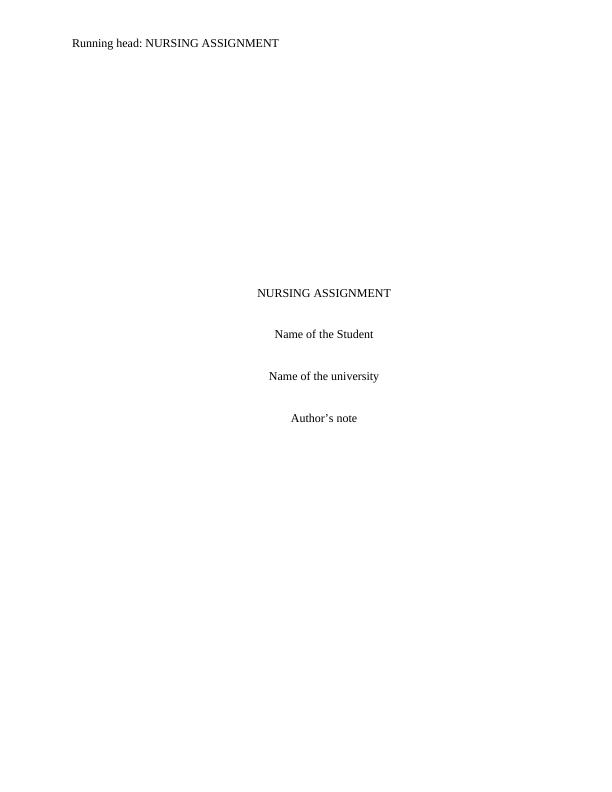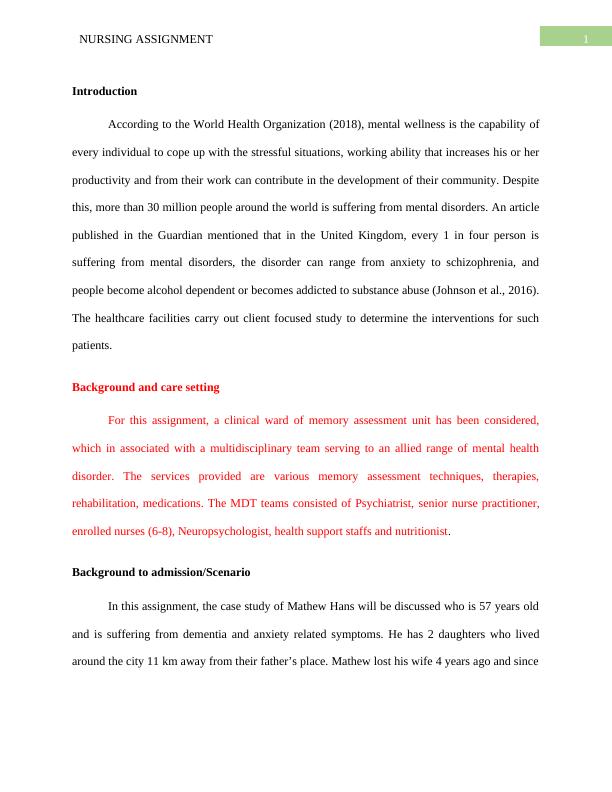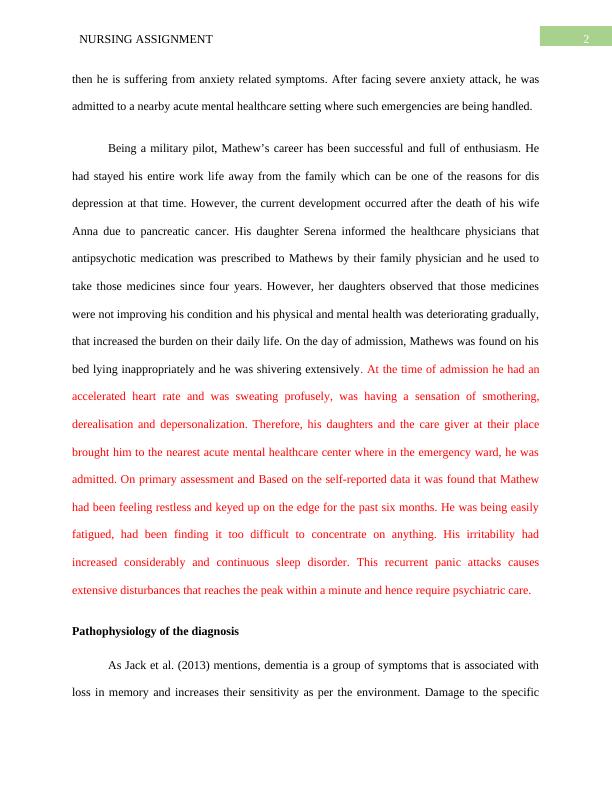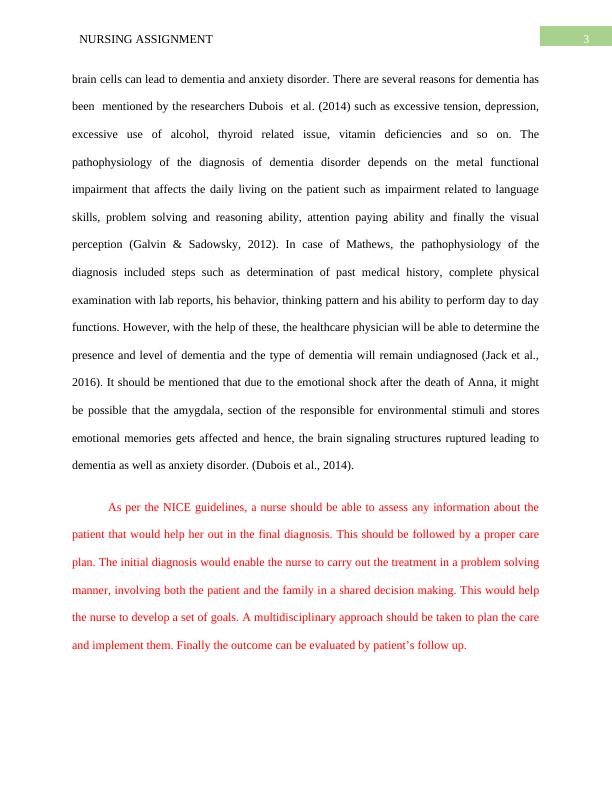Nursing Assignment on Dementia and Anxiety Disorder
Added on 2023-06-10
13 Pages3457 Words338 Views
Running head: NURSING ASSIGNMENT
NURSING ASSIGNMENT
Name of the Student
Name of the university
Author’s note
NURSING ASSIGNMENT
Name of the Student
Name of the university
Author’s note

1NURSING ASSIGNMENT
Introduction
According to the World Health Organization (2018), mental wellness is the capability of
every individual to cope up with the stressful situations, working ability that increases his or her
productivity and from their work can contribute in the development of their community. Despite
this, more than 30 million people around the world is suffering from mental disorders. An article
published in the Guardian mentioned that in the United Kingdom, every 1 in four person is
suffering from mental disorders, the disorder can range from anxiety to schizophrenia, and
people become alcohol dependent or becomes addicted to substance abuse (Johnson et al., 2016).
The healthcare facilities carry out client focused study to determine the interventions for such
patients.
Background and care setting
For this assignment, a clinical ward of memory assessment unit has been considered,
which in associated with a multidisciplinary team serving to an allied range of mental health
disorder. The services provided are various memory assessment techniques, therapies,
rehabilitation, medications. The MDT teams consisted of Psychiatrist, senior nurse practitioner,
enrolled nurses (6-8), Neuropsychologist, health support staffs and nutritionist.
Background to admission/Scenario
In this assignment, the case study of Mathew Hans will be discussed who is 57 years old
and is suffering from dementia and anxiety related symptoms. He has 2 daughters who lived
around the city 11 km away from their father’s place. Mathew lost his wife 4 years ago and since
Introduction
According to the World Health Organization (2018), mental wellness is the capability of
every individual to cope up with the stressful situations, working ability that increases his or her
productivity and from their work can contribute in the development of their community. Despite
this, more than 30 million people around the world is suffering from mental disorders. An article
published in the Guardian mentioned that in the United Kingdom, every 1 in four person is
suffering from mental disorders, the disorder can range from anxiety to schizophrenia, and
people become alcohol dependent or becomes addicted to substance abuse (Johnson et al., 2016).
The healthcare facilities carry out client focused study to determine the interventions for such
patients.
Background and care setting
For this assignment, a clinical ward of memory assessment unit has been considered,
which in associated with a multidisciplinary team serving to an allied range of mental health
disorder. The services provided are various memory assessment techniques, therapies,
rehabilitation, medications. The MDT teams consisted of Psychiatrist, senior nurse practitioner,
enrolled nurses (6-8), Neuropsychologist, health support staffs and nutritionist.
Background to admission/Scenario
In this assignment, the case study of Mathew Hans will be discussed who is 57 years old
and is suffering from dementia and anxiety related symptoms. He has 2 daughters who lived
around the city 11 km away from their father’s place. Mathew lost his wife 4 years ago and since

2NURSING ASSIGNMENT
then he is suffering from anxiety related symptoms. After facing severe anxiety attack, he was
admitted to a nearby acute mental healthcare setting where such emergencies are being handled.
Being a military pilot, Mathew’s career has been successful and full of enthusiasm. He
had stayed his entire work life away from the family which can be one of the reasons for dis
depression at that time. However, the current development occurred after the death of his wife
Anna due to pancreatic cancer. His daughter Serena informed the healthcare physicians that
antipsychotic medication was prescribed to Mathews by their family physician and he used to
take those medicines since four years. However, her daughters observed that those medicines
were not improving his condition and his physical and mental health was deteriorating gradually,
that increased the burden on their daily life. On the day of admission, Mathews was found on his
bed lying inappropriately and he was shivering extensively. At the time of admission he had an
accelerated heart rate and was sweating profusely, was having a sensation of smothering,
derealisation and depersonalization. Therefore, his daughters and the care giver at their place
brought him to the nearest acute mental healthcare center where in the emergency ward, he was
admitted. On primary assessment and Based on the self-reported data it was found that Mathew
had been feeling restless and keyed up on the edge for the past six months. He was being easily
fatigued, had been finding it too difficult to concentrate on anything. His irritability had
increased considerably and continuous sleep disorder. This recurrent panic attacks causes
extensive disturbances that reaches the peak within a minute and hence require psychiatric care.
Pathophysiology of the diagnosis
As Jack et al. (2013) mentions, dementia is a group of symptoms that is associated with
loss in memory and increases their sensitivity as per the environment. Damage to the specific
then he is suffering from anxiety related symptoms. After facing severe anxiety attack, he was
admitted to a nearby acute mental healthcare setting where such emergencies are being handled.
Being a military pilot, Mathew’s career has been successful and full of enthusiasm. He
had stayed his entire work life away from the family which can be one of the reasons for dis
depression at that time. However, the current development occurred after the death of his wife
Anna due to pancreatic cancer. His daughter Serena informed the healthcare physicians that
antipsychotic medication was prescribed to Mathews by their family physician and he used to
take those medicines since four years. However, her daughters observed that those medicines
were not improving his condition and his physical and mental health was deteriorating gradually,
that increased the burden on their daily life. On the day of admission, Mathews was found on his
bed lying inappropriately and he was shivering extensively. At the time of admission he had an
accelerated heart rate and was sweating profusely, was having a sensation of smothering,
derealisation and depersonalization. Therefore, his daughters and the care giver at their place
brought him to the nearest acute mental healthcare center where in the emergency ward, he was
admitted. On primary assessment and Based on the self-reported data it was found that Mathew
had been feeling restless and keyed up on the edge for the past six months. He was being easily
fatigued, had been finding it too difficult to concentrate on anything. His irritability had
increased considerably and continuous sleep disorder. This recurrent panic attacks causes
extensive disturbances that reaches the peak within a minute and hence require psychiatric care.
Pathophysiology of the diagnosis
As Jack et al. (2013) mentions, dementia is a group of symptoms that is associated with
loss in memory and increases their sensitivity as per the environment. Damage to the specific

3NURSING ASSIGNMENT
brain cells can lead to dementia and anxiety disorder. There are several reasons for dementia has
been mentioned by the researchers Dubois et al. (2014) such as excessive tension, depression,
excessive use of alcohol, thyroid related issue, vitamin deficiencies and so on. The
pathophysiology of the diagnosis of dementia disorder depends on the metal functional
impairment that affects the daily living on the patient such as impairment related to language
skills, problem solving and reasoning ability, attention paying ability and finally the visual
perception (Galvin & Sadowsky, 2012). In case of Mathews, the pathophysiology of the
diagnosis included steps such as determination of past medical history, complete physical
examination with lab reports, his behavior, thinking pattern and his ability to perform day to day
functions. However, with the help of these, the healthcare physician will be able to determine the
presence and level of dementia and the type of dementia will remain undiagnosed (Jack et al.,
2016). It should be mentioned that due to the emotional shock after the death of Anna, it might
be possible that the amygdala, section of the responsible for environmental stimuli and stores
emotional memories gets affected and hence, the brain signaling structures ruptured leading to
dementia as well as anxiety disorder. (Dubois et al., 2014).
As per the NICE guidelines, a nurse should be able to assess any information about the
patient that would help her out in the final diagnosis. This should be followed by a proper care
plan. The initial diagnosis would enable the nurse to carry out the treatment in a problem solving
manner, involving both the patient and the family in a shared decision making. This would help
the nurse to develop a set of goals. A multidisciplinary approach should be taken to plan the care
and implement them. Finally the outcome can be evaluated by patient’s follow up.
brain cells can lead to dementia and anxiety disorder. There are several reasons for dementia has
been mentioned by the researchers Dubois et al. (2014) such as excessive tension, depression,
excessive use of alcohol, thyroid related issue, vitamin deficiencies and so on. The
pathophysiology of the diagnosis of dementia disorder depends on the metal functional
impairment that affects the daily living on the patient such as impairment related to language
skills, problem solving and reasoning ability, attention paying ability and finally the visual
perception (Galvin & Sadowsky, 2012). In case of Mathews, the pathophysiology of the
diagnosis included steps such as determination of past medical history, complete physical
examination with lab reports, his behavior, thinking pattern and his ability to perform day to day
functions. However, with the help of these, the healthcare physician will be able to determine the
presence and level of dementia and the type of dementia will remain undiagnosed (Jack et al.,
2016). It should be mentioned that due to the emotional shock after the death of Anna, it might
be possible that the amygdala, section of the responsible for environmental stimuli and stores
emotional memories gets affected and hence, the brain signaling structures ruptured leading to
dementia as well as anxiety disorder. (Dubois et al., 2014).
As per the NICE guidelines, a nurse should be able to assess any information about the
patient that would help her out in the final diagnosis. This should be followed by a proper care
plan. The initial diagnosis would enable the nurse to carry out the treatment in a problem solving
manner, involving both the patient and the family in a shared decision making. This would help
the nurse to develop a set of goals. A multidisciplinary approach should be taken to plan the care
and implement them. Finally the outcome can be evaluated by patient’s follow up.

End of preview
Want to access all the pages? Upload your documents or become a member.
Related Documents
ISBAR Clinical Handover for Mental Health Patient | HLTH 1037lg...
|7
|2281
|291
Mental Health OSCA Assessment 2 - ISBAR Clinical Handoverlg...
|6
|1674
|204
Nursing Assignment - Professional Development Planlg...
|8
|1355
|71
Simulated Mental Health Client Care Setting - Assessmentlg...
|18
|4264
|339
5 EFFECTIVE & EVIDENCE BASED ACUTE CARElg...
|16
|3726
|22
Proposal for practice care improvementlg...
|11
|3364
|67
